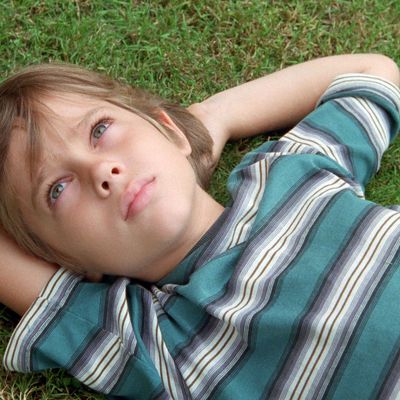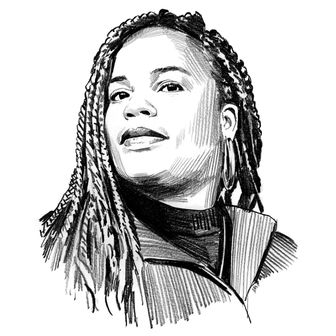
Boy envy hit me pretty early on in Richard Linklater’s Boyhood. It was during a throwaway moment between the main character, Mason, and his sister, Samantha, as they walk around their suburban Texas neighborhood. Mason is on his bike, flanked by two friends, while Samantha trails quietly behind on foot, giggling occasionally with her own friends. Nothing at all happens. But as the tag-along little sister to three brothers, I could easily fill in that narrative. I remember trudging on foot behind my own brother and his friends, letting them lead the adventures, standing around while they zoomed around me on two wheels. I remember thinking: I should be quiet. But this is so boring. Where’s my bike? Being a boy always seemed like so much more fun.
I was never privy to the separate inner lives of the boys I grew up with. In fact, my brothers often forcibly kept me out. But after spending three hours in Mason’s world, I found myself wishing I had experienced Linklater’s brand of boyhood: still, charming, full of mystery, and — most important — free.
Linklater managed to create a movie about growing up without relying on those prefab milestones that usually make up a coming-of-age tale. There are no major “firsts.” Instead, the 12 years we see onscreen take shape through the smallest, most mundane slivers of a life. We’re just in Mason’s world while he tags walls, sneaks into abandoned houses, and goes camping with his dad. There’s never any rush for him to figure out how he “feels” about stuff, and his thoughts about it all are nobody else’s business.
Mason’s depicted as fiercely independent, constantly ferreting out his own little corners and pockets of quiet. Even in party scenes, you get a sense of introspection. Yes, we’re in his world, but he’s always in his own — be it the one in his own head or in the actual physical one. Maybe because Mason spends so much time talking with his dad while wandering outside, Boyhood’s version of the life of boys embodies the spirit of Walden Pond. The film encourages escaping into nature as a way to find space reflection and solitude.
In this movie — and in my own experience — girlhood always included the labor of developing a shareable emotional intelligence. There was an early awareness of social obligations and a duty to consider my place in the world through the actions and reactions of everyone else around me. Boyhood and Boyhood mean undisturbed time and freedom to explore and be fearless.
My older brothers certainly had that freedom. Boundaries were there for them to break; abandoned homes were there for them to enter at will. For them, like Mason, childhood was Thoreauvian — with an emphasis on being left to “be.” They could roam and disappear as they wanted to. I’d ride off on my bike only to be called back home. While they slipped off to some weird shanty clubhouse in the woods, I’d be the nag sent out by my mother to retrieve them for dinner and baths. Their curfews operated about as effectively as the Met’s “suggested donation” rule, while mine lasted until I was 19 — midnight, 12:30 a.m. if I remembered to call. Their world was all theirs. Nobody demanded entry and nobody demanded an explanation. That’s the difference when coming of age as a girl — nobody ever just leaves you alone.
The movie’s women and girls act as mirrors, reflecting the kind of person Mason is shaping up to be. And after 28 years of having brothers and boyfriends and boy crushes, I knew exactly how it felt to be there. I knew the intentions of the 8-year-old girl who passed him love notes in class after he got a bad haircut or the 18-year-old girlfriend who listened dutifully to his broody opinions about society and Facebook. They were closing the emotional gaps and providing the boundaries.
Since the film’s release, the discussions of boyhood versus girlhood have been popping up in the press. In an interview with the Village Voice, Linklater says his film could easily double as a story about a girl, while Judy Berman at Flavorwire ponders whether moviegoers would be so enthusiastic if the movie were called Girlhood. I’ve tried to imagine how a movie called Girlhood might play out, at least based on my own girlhood. Would there be the same quiet? Would there be the same silence-filled, brooding entry into adulthood? Would the camera pan to find me alone in an alley, contentedly poking at a dead bird long after my friends went home? No. It would find me running home to the comforting frenzy of a big family instead of relishing in solitary time. It would be all the high-highs and low-lows and stereotypical fireworks and not the introspective stuff in between, and I’d offer up the emotional material for a voyeuristic audience because the movie would demand entry into that inner monologue. There would absolutely be a narrated “Dear Diary” montage or two and the audience would definitely end up crying. Bring tissues; expect lots of Alanis.
My mother recently said to me that she wishes my dad had been the stay-at-home parent instead of her because he would have been around to take me on long walks and to teach me about nature. Mostly, she said, she thinks I would have grown up unafraid of all the things she was afraid of and approached the world in a different way. He would have raised me “like he raised my brothers.” I wondered how she observed those differences — she said something about “being able to kill bugs without calling 9-1-1” while I would chalk it up to my early curfew versus their ability to stay out all night. But after experiencing Boyhood, I realize she wishes I had been left alone to roam. To introspectively explore, spray graffiti, break the rules with little more than a hair ruffle as consequence, and contemplate the world while someone else worried about making me come home for dinner.





